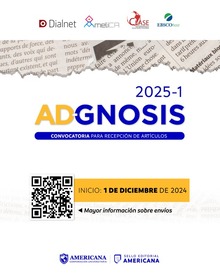Productividad de los trabajadores de Coltrans Barranquilla considerando la incidencia del liderazgo, durante el Covid-19
DOI:
https://doi.org/10.21803/adgnosis.13.13.699Palabras clave:
Productividad, Liderazgo, Colaboradores, Equipos de trabajo, DesempeñoResumen
i) introducción: la ausencia de un buen liderazgo se refleja directamente en la motivación, comunicación, ambiente laboral y rendimiento de los colaboradores de una empresa, de manera negativa; ii) objetivo: determinar la incidencia del liderazgo en la productividad de los colaboradores de la compañía Coltrans Barranquilla durante el periodo de la pandemia; iii) metodología: el enfoque de este estudio responde a una investigación cuantitativa con alcance descriptivo. Se empleó un cuestionario tipo encuesta con respuestas en escala Likert, a una muestra de 21 participantes, cuyas respuestas fueron anónimas; iv) Resultados: se identificó que la compañía Coltrans, a pesar de contar con una fuerte infraestructura y ofrecer una estabilidad laboral, presenta inconvenientes con el liderazgo en cada una de sus áreas, por lo que, se encontró una falta de reconocimiento y fortalecimiento de los equipos de trabajo llevándolos a nivel alto de deserción; v) conclusiones: la función del liderazgo en las organizaciones puede ser la diferencia entre el desempeño, bienestar laboral y productividad de la empresa, especialmente en momentos de contingencias como lo vivido durante el covid-19.
Descargas
Referencias
Amankwah-Amoah, J., Khan, Z., Wood, G., & Knight, G. (2021). COVID-19 and digitalization: The great acceleration. Journal of Business Research, 136, 602–611. https://doi.org/10.1016/j.jbusres.2021.08.011
Amini, A., Dorri, R., & Ahmadi, M. (2022). Identifying Factors Affecting Teleworking Productivity During COVID-19 Pandemic Using Fuzzy Techniques. Journal of Productivity Management, 16(61), 101–138. https://doi.org/10.30495/QJOPM.2022. 1938636.3213
Balk, W., Olshfski, D., Epstein, P., & Holzer, M. (1991). Perspectives on Productivity. Public Productivity & Management Review, 15(2), 265. https://doi.org/10.2307/3380770
Bushe, G. R., & Lewis, S. (2023). Three change strategies in organization development: data-based, high engagement and generative. Leadership and Organization Development Journal, 44(2), 173–188. https://doi.org/10.1108/LODJ-05-2022-0229
Caldwell, C., Ichiho, R., & Anderson, V. (2017). Understanding level 5 leaders: the ethical perspectives of leadership humility. Journal of Management Development, 36(5), 724–732. https://doi.org/10.1108/JMD-09-2016-0184
Catană, S.-A., Toma, S.-G., Imbrişcă, C., & Burcea, M. (2022). Teleworking Impact on Wellbeing and Productivity: A Cluster Analysis of the Romanian Graduate Employees. Frontiers in Psychology, 13, 1–13. https://doi.org/https://doi.org/10.3389/fpsyg.2022.856196
Charalampous, M., Grant, C. A., Tramontano, C., & Michailidis, E. (2019). Systematically reviewing remote e-workers’ well-being at work: a multidimensional approach. European Journal of Work and Organizational Psychology, 28(1), 51–73. https://doi.org/10.1080/1359432X.2018.1541886
Collins, J. (2001). Level 5 Leadership: The Triumph of Humility and Fierce Resolve. Harvard Business Review, 66–76. http://0-eds.a.ebscohost.com.pugwash.lib.warwick.ac.uk/eds/detail/detail?sid=7b9dbab0-f7e2-4096-a5eb-ed92485d8c29%40sessionmgr4007&vid=0&hid=4210&bdata=JnNpdGU9ZWRzLWxpdmU%3D#AN=17602072&db=bth
Contreras, F., Baykal, E., & Abid, G. (2020). E-Leadership and Teleworking in Times of COVID-19 and Beyond: What We Know and Where Do We Go. Frontiers in Psychology, 11, 1–11. https://doi.org/10.3389/fpsyg.2020.590271
da Cruz, M., Nunes, A., & Pinheiro, P. (2011). Fiedler’s Contingency Theory: Practical Application of the Least Preferred Coworker ( LPC ) Scale. IUP Journal of Organizational Behavior, 10(4), 7–26.
de Oliveira, C., Saka, M., Bone, L., & Jacobs, R. (2023). The Role of Mental Health on Workplace Productivity: A Critical Review of the Literature. Applied Health Economics and Health Policy, 21(2), 167–193. https://doi.org/10.1007/s40258-022-00761-w
García-Salirrosas, E. E., & Millones-Liza, D. Y. (2023). Aceptación de la tecnología y su relación con el desempeño laboral de los teletrabajadores. Revista Venezolana de Gerencia, 28(9 Especial), 199–214. https://doi.org/10.52080/rvgluz.28.e9.13
Hurtado de Barrera, J. (2000). Metodologia de la Investigación Holística (3rd ed.). Sypal & Instituto Universitario de Tecnología Caripito. https://ayudacontextos.files.wordpress.com/2018/04/jacqueline-hurtado-de-barrera-metodologia-de-investigacion-holistica.pdf
Ketudat, S., & Jeenanunta, C. (2021). Impact of the COVID-19 pandemic on logistics firms and their resilience: Case studies in Thailand. Engineering Management in Production and Services, 13(3), 86–98. https://doi.org/10.2478/emj-2021-0023
Kilag, O., Tiongzon, B., Paragoso, S., Ompad, E., Bibon, M., Alvez, G., & Sasan, J. (2023). HIGH COMMITMENT WORK SYSTEM AND DISTRIBUTIVE LEADERSHIP ON EMPLOYEE PRODUCTIVE BEHAVIOR. International Journal of Economy and Innovation, 36, 389–409. https://www.gospodarkainnowacje-pl.openconference.us/index.php/issue_view_32/article/view/1587/1487
Lorenzo, E. (2018). La Productividad Laboral y Competencia Laboral de los servidores públicos de la Dirección General de Formación Profesional y Capacitación Laboral del MTPE – Lima, 2017 [Universidad César Vallejo]. https://repositorio.ucv.edu.pe/bitstream/handle/20.500.12692/23150/LORENZO_GEP.pdf?sequence=1&isAllowed=y#:~:text=Los autores Robbins y Judge,de eficacia como de eficiencia.
Manciati-Alarcón, R. X. (2021). Impulso Social y Empresarial en Época de Pandemia. Economía y Negocios, 12(2), 116–121. https://doi.org/10.29019/eyn.v12i2.973
Mayer, C., Sivatheerthan, T., Mütze-Niewöhner, S., & Nitsch, V. (2023). Sharing leadership behaviors in virtual teams: effects of shared leadership behaviors on team member satisfaction and productivity. Team Performance Management, 29(1–2), 90–112. https://doi.org/10.1108/TPM-07-2022-0054
Mayo, E. (2004). The Human Problems Of An Industrial Civilization (1st Editio, Vol. 6). Routledge. https://doi.org/10.4324/9780203487273
Mayo, E. (2014). The social problems of an industrial civilisation: With an appendix on the political problem. The Social Problems of an Industrial Civilisation: With an Appendix on the Political Problem, 1–148. https://doi.org/10.4324/9781315824277
Mondragon, D. (2017). Administración de Empresas (Primera). Fondo editorial Areandino. https://digitk.areandina.edu.co/bitstream/handle/areandina/1195/Administración de Empresas.pdf?sequence=1&isAllowed=y
Newstrom, J. W. (2007). Organizational Behavior Human Behavior at Work (12th editi). McGraw-Hill Education.
Parsoya, S., & Perwej, A. (2021). The impacts of Covid-19 Pandemic on Businesses and Economies: Global Perspectives. Journal of Internarional Business and Economy, 22(1), 109–126. https://doi.org/10.5281/zenodo.5668067
Prasada, K. D. V., Vaidyab, R. W., & Mangipudic, M. R. (2020). Effect of occupational stress and remote working on psychological well-being of employees: an empirical analysis during covid-19 pandemic concerning information technology industry in hyderabad. Indian Journal of Commerce & Management Studies, XI(2), 1–13. https://doi.org/10.18843/ijcms/v11i2/01
Romero, J. C. (2022). Negocios y tecnología: los partidarios para generar competitividad empresarial [Universidad De La Salle]. In Ciencia Unisalles. https://ciencia.lasalle.edu.co/negocios_relaciones/274
Schriesheim, C., & Klich, N. (1987). Fiedler’s Least Preferred Coworker (LPC) Instrument: An Investigation of its True Bipolarity. Hispanic Journal of Behavioral Sciences, 9(2), 305. http://hjb.sagepub.com.proxy.lib.umich.edu/content/9/2/183.full.pdf+html
Sharma, P., Leung, T. Y., Kingshott, R. P. J., Davcik, N. S., & Cardinali, S. (2020). Managing uncertainty during a global pandemic: An international business perspective. Journal of Business Research, 116, 188–192. https://doi.org/10.1016/j.jbusres.2020.05.026
Stoker, J. I., Garretsen, H., & Lammers, J. (2022). Leading and Working From Home in Times of COVID-19: On the Perceived Changes in Leadership Behaviors. Journal of Leadership and Organizational Studies, 29(2), 208–218. https://doi.org/10.1177/15480518211007452
Tafvelin, S., Lundmark, R., von Thiele Schwarz, U., & Stenling, A. (2023). Why do leaders engage in destructive behaviours? The role of leaders’ working environment and stress. Journal of Occupational and Organizational Psychology, 96(1), 165–181. https://doi.org/10.1111/joop.12413
Velásquez, A., & Martínez, J. (2021). Factores de la reingeniería de negocios en tiempos de COVID-19. Revista Especializada de Ingeniería y Ciencias de La Tierra, 1(1), 90–103. https://revistas.up.ac.pa/index.php/REICT
Verkerk, P. (1990). FIEDLER’S CONTINGENCY MODEL OF LEADERSHIP EFFECTIVENESS: BACKGROUND AND RECENT DEVELOPMENTS. Eindhoven University of Technology, 90(02), 1–24.
Voordt, T. van der, & Jensen, P. A. (2023). The impact of healthy workplaces on employee satisfaction, productivity and costs. Journal of Corporate Real Estate, 25(1), 29–49. https://doi.org/10.1108/JCRE-03-2021-0012
Wahyudi, L., Panjaitan, H., & Junaedi, A. (2023). Leadership Style, Motivation, and Work Environment on Job Satisfaction and Employee Performance at the Environment and Hygiene Department of Pekanbaru City. Journal of Applied Business and Technology, 4(1), 55–66. https://doi.org/10.35145/jabt.v4i1.119
Weber, C., Golding, S. E., Yarker, J., Lewis, R., Ratcliffe, E., Munir, F., Wheele, T. P., Häne, E., & Windlinger, L. (2022). Future Teleworking Inclinations Post-COVID-19: Examining the Role of Teleworking Conditions and Perceived Productivity. Frontiers in Psychology, 13, 1–17. https://doi.org/10.3389/fpsyg.2022.863197

Descargas
Publicado
Número
Sección
Licencia
Derechos de autor 2024 Ad-Gnosis

Esta obra está bajo una licencia internacional Creative Commons Atribución-NoComercial-SinDerivadas 4.0.





